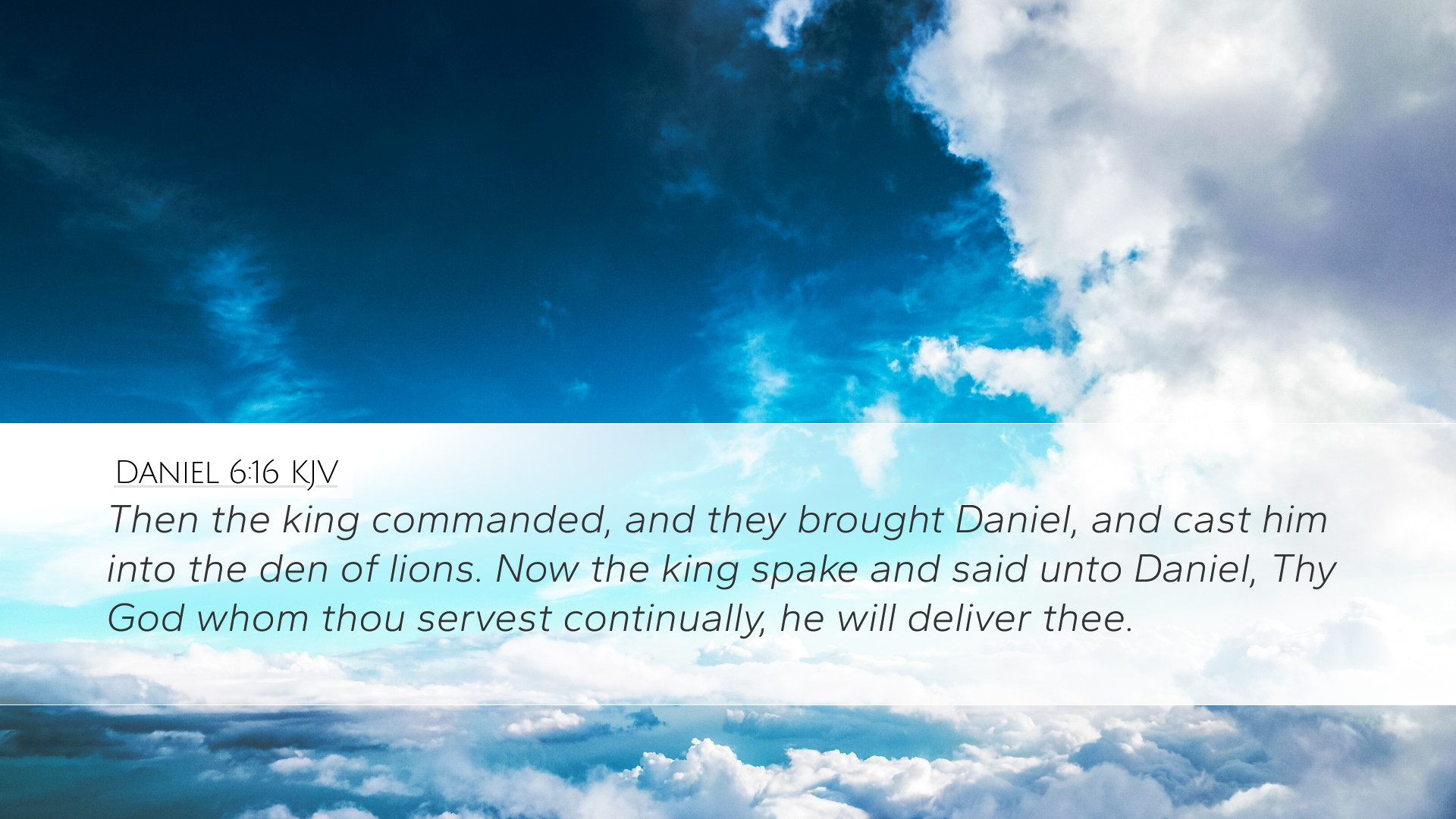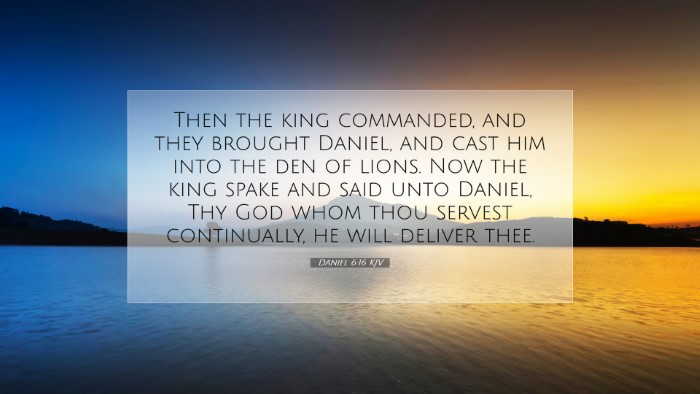Bible Commentary on Daniel 6:16
Verse Reference: Daniel 6:16 - "Then the king commanded, and they brought Daniel, and cast him into the den of lions. Now the king spake and said unto Daniel, Thy God whom thou servest continually, he will deliver thee."
Introduction
This verse encapsulates a critical moment in the life of Daniel, illustrating themes of faith, divine protection, and the tensions between personal conviction and political authority. Within the public domain commentaries of Matthew Henry, Albert Barnes, and Adam Clarke, insights are provided that shed light on the historical and theological significance of this event.
Contextual Background
Daniel, a Hebrew captive in Babylon, had gained favor in the court of King Darius due to his exceptional wisdom and the Spirit of God that resided in him. However, his integrity and piety stirred jealousy among the other governors and satraps, leading them to conspire against him. Their plotting culminated in the king's decree that anyone who prayed to any god other than the king for thirty days would be thrown into the den of lions. Daniel’s decision to continue praying three times a day, as was his custom, brought him into conflict with this edict.
Commentary Insights
Matthew Henry's Commentary
According to Matthew Henry, this verse illustrates the resolve of a faithful servant of God amidst opposition. He emphasizes Daniel's unwavering commitment to prayer and his deep relationship with God, which stands as a testimony of faithfulness. Henry notes that Daniel's faith is so profound that even the king acknowledges it, saying "Thy God whom thou servest continually, he will deliver thee." This recognition from the king serves not only as a poignant reflection of Darius' respect for Daniel but also as an indication of the power of Daniel's testimony.
Henry draws attention to the fact that the king, despite issuing the decree, still expresses hope in Daniel's God. This paradox highlights the struggle between political power and divine authority, reinforcing the belief that God's will ultimately surpasses human decree. The den of lions, in the context of Henry’s commentary, symbolizes trials that can be faced when one stands firm in faith.
Albert Barnes' Commentary
Albert Barnes provides an analysis of the implications of this verse, focusing on the king's role and his relationship with Daniel. Barnes points out that Darius, despite his position, is portrayed as a sympathetic figure who is troubled by the necessity of punishing Daniel, a man who serves him well. The king's statement signifies both affection and desperation, portraying a ruler caught between his decree and his regard for Daniel.
Barnes also addresses the environment of jealousy and deceit that surrounded Daniel. The conspirators' actions serve as a reminder of the dangers faced by those who embody righteousness in a corrupt society. He comments on the strength of Daniel's faith, suggesting that true faith is often proven by the trials we endure. Here, the den of lions symbolizes a place of danger that becomes a backdrop for God's miraculous deliverance.
Adam Clarke's Commentary
Adam Clarke’s commentary delves into the psychological and emotional dynamics of the narrative. He reflects on Darius’s predicament, noting the king’s regret and recognition of Daniel’s loyalty. Clarke highlights the humanity of the king, who, despite his position of power, feels helpless to alter the fate of Daniel due to the rigid nature of the law.
Furthermore, Clarke elaborates on Daniel's unyielding faith. His decision to pray openly, despite the royal decree, speaks of a profound spiritual conviction and courage. Clarke suggests that the emphasis on "the God whom thou servest continually" indicates that Daniel’s faithfulness was well known, and this consistency in his devotion put him in a position for God’s intervention. Clarke also notes how Daniel’s calm acceptance of his fate is an example of unwavering faith and trust in God’s deliverance.
Theological Themes
- Faithfulness Amidst Trial: The unshakeable faith of Daniel even in the face of death exemplifies what it means to be faithful to God in a secular and often hostile environment.
- The Sovereignty of God: This narrative underscores the belief that God's sovereignty prevails over earthly kings and decrees, a theme consistent throughout scripture.
- The Power of Prayer: Daniel's commitment to prayer serves as an important reminder of the necessity and power of prayer in the life of a believer, particularly during times of adversity.
- Divine Protection: The expectation that God will deliver His faithful servants is a recurring motif, assuring believers of divine support in times of trouble.
- The Impact of Faith on Others: The king's recognition of Daniel's God illustrates how the faith of one individual can impact those around them, even those in positions of power.
Conclusion
Daniel 6:16 stands as a powerful testament to the interplay between faith, loyalty, and the challenges posed by earthly authorities. Enriched by insights from Matthew Henry, Albert Barnes, and Adam Clarke, this commentary serves to illuminate the profundity of Daniel’s experience—how a steadfast heart can inspire hope, elicit compassion, and ultimately reveal the glory of God in the midst of distressing circumstances. For pastors, students, theologians, and Bible scholars, this account encourages a deepened understanding of perseverance and faith irrespective of the circumstances faced.


